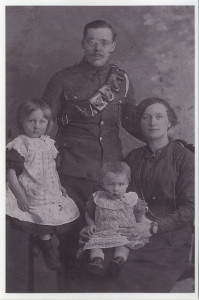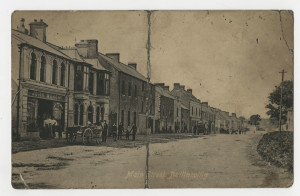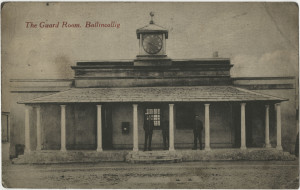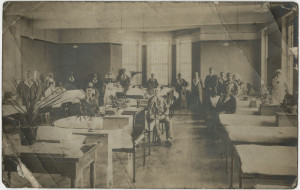Richard Wilkinson was born in 1890 and worked as a Composite Miner at Linton Colliery, living in Ashington, Northumberland. At the age of 26 he received his call up notice to join the Royal Field Artillery and had to leave his wife Evelyn and their children, Lillian 3 and James 1.
It was sometime around July 1916 and having completed his basic training, Dick was posted to Ireland to a town called Ballincollig, County Cork.

It was not a pleasant posting, as English Tommie’s were not welcome in Ireland at this time. Surprisingly now after 100 years, the buildings in Main Street look the same; although obviously the shop fronts & pavements have been modernised.
The barracks still exist; although these were remodelled in 1944, but part of the original Guard House entrance remains.

After they completed their spell of duty in Ireland, Dick and his comrades were shipped out to France landing at Le Havre before arriving in the trenches. The R.F.A. had large ordnance, which were pulled by a team of horses to get them into the right position and part of Dick’s duties was to care for one particular horse and they became quite attached.
The battle of Passchendaele lasted from July to November 1917 and it was during this fighting, Dick was badly wounded in one leg. He lay for some time in “No Man’s Land” before being taken to a Dressing Station and eventually being transported back to ‘Blighty’.He was taken to Queen Mary’s Hospital in Walley, Lancashire where the skill of the surgeons and the nursing staff saved his leg from amputation; although it would always be half the size of the other one. Unfortunately, the hospital no longer exists – it’s now a housing estate, but the entrance into the estate still bears the original stone gate posts of the hospital. Dick was to remain in the hospital for a year before finally returning home in 1919. A second son, Robert was born in 1920.
Not long after returning to Ashington Dick was invalided out of the Army with a 10/-d per week pension which he drew right up to his death in November 1952. One morning Dick heard the Co-op Milk Cart turn into the street and to his surprise, the horse pulling the cart was his horse from the trenches and they both recognised each other. Now what odds do you think Ladbrokes would quote for that happening? Needless to say that horse got titbits every morning,
Dick returned to Composite Mining at Linton though as the years passed, due partly to his war injury and partly to accidents that occurred underground, he had to take on easier shift work, working in the area at the bottom of the shaft.
A third son, Richard, was born in 1925, and dear readers – I married him!
We would like to express our sincere appreciation to Jean Wilkinson in supplying this article for the Northumberland At War Project.


This is a great article, full of interesting detail and capturing the sense of commitment of local people to their own neighbourhood and strong feelings of loyalty. Thank you Jean Wilkinson for writing this.
Cheers for this Ted i have passed your comment on to Jean. Thanks for taking time to read and comment on the story.
Absolutely lovely story.
Thanks you Carol, I have passed your comment on to Jean. Thank you for spending the time and reading this story.
What a lovely local history story,my grandparents were from Ashington and grandad served in the 1914 /18 war and great grandma was born in Cork !
Dont know when the dairy started at Ashington Farm, but the Herdman family were certainly there in 1916. All the horses that pulled the milk float were known as “Tommy” until the dairy round ceased circa 1985/86 when Mary Herdman (married name Mary Douglas) died. Wonder if the first horse they had was an “old soldier” too? Hence the name?
That’s an interesting theory Susie. Could be true.